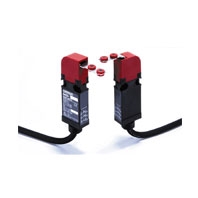Slim Safety Door Switch
D4GS-N
 Slim Safety Door Switches with IP67 Rating
Slim Safety Door Switches with IP67 Rating
Standards and EC Directives
Conforms to the following EC Directives:
• Machinery Directive
• Low Voltage Directive
• EN ISO 14119
• EN60204-1
• GS-ET-15
Certified Standards
|
Certification body |
Standard |
File No. |
|
TÜV SÜD |
EN60947-5-1 |
Consult your OMRON |
|
UL * |
UL508 |
E76675 |
|
CQC (CCC) |
GB/T 14048.5 |
Consult your OMRON |
* Certification for CSA C22.2 No. 14 is authorized by the UL mark.
Certified Standard Ratings
TÜV (EN60947-5-1), CCC (GB/T 14048.5)
|
Utilization category |
AC-15 |
DC-13 |
|
Rated operating current (Ie) |
0.75 A |
0.27 A |
|
Rated operating voltage (Ue) |
240 V |
250 V |
Note: Use a 10 A fuse type gI or gG that conforms to IEC60269 as a short-circuit protection device.
UL/CSA (UL508, CSA C22.2 No. 14)
C300
|
Rated voltage |
Carry current |
Current (A) |
Volt-amperes (VA) |
||
|
Make |
Break |
Make |
Break |
||
|
120 VAC |
2.5 A |
15 |
1.5 |
1,800 |
180 |
|
240 VAC |
7.5 |
0.75 |
|||
Q300
|
Rated voltage |
Carry current |
Current (A) |
Volt-amperes (VA) |
||
|
Make |
Break |
Make |
Break |
||
|
125 VDC |
2.5 A |
0.55 |
0.55 |
69 |
69 |
|
250 VDC |
0.27 |
0.27 |
|||
Characteristics
|
Interlock type |
Type 2 (EN ISO 14119) |
|
|
Coding level |
Low level coded (EN ISO 14119) |
|
|
Degree of protection *1 |
IP67 (EN60947-5-1) |
|
|
Durability *2 |
Mechanical |
1,000,000 operations min. |
|
Electrical |
100,000 operations min. (1 A resistive load at 125 VAC) *3 |
|
|
Operating speed |
0.1 to 0.5 m/s |
|
|
Operating frequency |
30 operations/minute max. |
|
|
Direct opening force *4 |
60 N min. |
|
|
Direct opening travel *4 |
10 mm min. |
|
|
Contact resistance |
300 mΩ max. (with 1 m cable) |
|
|
Minimum applicable load *5 |
Resistive load of 4 mA at 24 VDC (N-level reference value) |
|
|
Rated insulation voltage (Ui) |
250 V |
|
|
Rated frequency |
50/60 Hz |
|
|
Protection against electric shock |
Class II (double insulation) |
|
|
Pollution degree (operating environment) |
3 (EN60947-5-1) |
|
|
Impulse withstand |
Between terminals of same polarity |
2.5 kV |
|
Between terminals of different |
4 kV |
|
|
Between each terminal and non- |
6 kV |
|
|
Insulation resistance |
100 MΩ min. (at 500 VDC) between terminals of the same polarities, |
|
|
Contact gap |
2 × 2 mm min. |
|
|
Vibration resistance |
Malfunction |
10 to 55 Hz, 0.35 mm single amplitude |
|
Shock resistance |
Destruction |
1,000 m/s2 min. |
|
Malfunction |
300 m/s2 min. |
|
|
Conditional short-circuit current |
100 A (EN60947-5-1) |
|
|
Conventional free air thermal current (Ith) |
2.5 A (EN60947-5-1) |
|
|
Ambient operating temperature |
-30 to 70°C (with no icing) |
|
|
Ambient operating humidity |
95% max. |
|
|
Cable |
UL2464 No. 22 AWG, finishing O.D.: 7.2 mm |
|
|
Weight |
Approx. 120 g (D4GS-N1R, with 1 m cable) |
|
Note: 1. The above values are initial values.
2. The Switch contacts can be used with either standard loads or microloads. Once the contacts have been used to switch a load, however, they cannot be used to switch smaller loads. The contact surfaces will become rough once they have been used and contact reliability for smaller loads may be reduced.
*1. The degree of protection shown above is based on the test method specified in EN60947-5-1. Be sure to confirm in advance the sealing performance under the actual operating environment and conditions. Although the switch box is protected from dust, oil, or water penetration, do not use the D4GS-N in places where dust, oil, water, or chemicals may enter through the key hole on the head, otherwise Switch damage or malfunctioning may occur.
*2. The durability conditions are an ambient temperature of 5 to 35°C and an ambient humidity of 40% to 70%. For more details, consult your OMRON representative.
*3. When the ambient temperature is 35°C or higher, do not apply 1 A at 125 VAC to more than one circuit.
*4. These figures are minimum requirements for safe operation.
*5. The value given for minimum applicable load is a reference value for microloads. The value will vary depending on factors such as the switching frequency, the ambient environment, and the reliability level. Be sure to confirm correct operation with the actual load before application.





